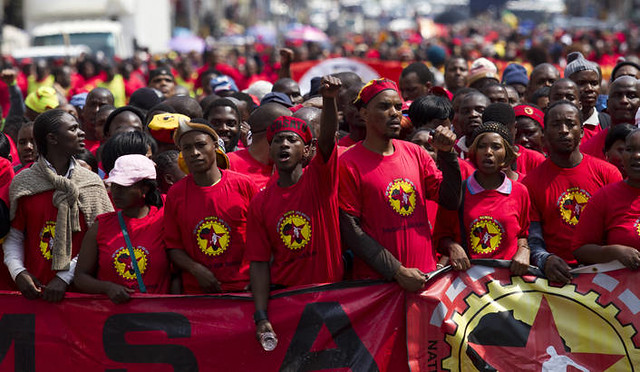Last updated on 10/02/2023
Workers target one of the largest employers in ongoing battle over medical health benefits
Lucas Ledwaba
A security guard requiring urgent medical care consults a doctor but is shocked to discover that though his employer deducts monthly premiums towards a health benefit plan – they are not covered to receive any health benefits.
This leaves the stranded worker no choice but to either dig into their pocket to settle the medical bill or alternatively, join the long queues at the overburdened public health care facilities.
According to unions organising in the private security sector, this is the grim reality facing thousands of security guards.
Union officials organising in the sector narrate shocking accounts of exploitation, intimidation, victimisation, dangerous working conditions, a failure by employers to comply with labour relations regulations and fraudulent schemes to avoid registering employees for benefits and low wages.
In the latest run in between unions in the sector and private security companies, scores of security guards are set to take to the streets this week to march on the premises of iMvula Group.
The march on the offices of iMvula Security is organised by the National Union of Metalworkers of South Africa (NUMSA), Kungwini Amalgamated Workers Union (KAWU), Abanqobi Workers Union (AWU), South African Transport and Allied Workers Union (SATAWU) and “progressive unions in the private security sector”.
The unions say they are marching “to protest against iMvula Group’s continued fraudulent deductions of millions of rands from the salaries of poorly paid security officers despite not relaying such deductions to the designated healthcare service provider.”
Numerous attempts to solicit comment from iMvula did not succeed. Johannesburg-based iMvula says on its website it “provides a host of comprehensive risk management services which allow us to manage your risks while you focus on your core business”.
The protest action is the latest attempt by unions to force private security companies to pay back an estimated R75 million which they claim “has been fraudulently deducted from the salaries of private security officers, in the last 10 months.”
Unions say that the probe affects more than 30,000 security guards and about R75-million in deductions so far.

The matter goes back to March 2021 when the National Bargaining Council for the Private Security Sector (NBCPSS) approved a health insurance benefits scheme for the sector. This followed the signing of a collective bargaining agreement with employers and unions.
The NBCPSS is registered in terms of the Labour Relations Act and cites its primary aim and purpose as “to regulate, maintain and enforce the terms and conditions as set out in the Main Collective Agreement.
According to the Main Collective Agreement, registered trade unions and employer organisations represent employees falling within the scope of the security sector.”
Based on the agreement, the scheme was to be administered by Affinity Health and workers were to pay a compulsory R250 monthly insurance, half of which was deducted from salaries.
“In South Africa, there are approximately 700 000 security officers, but only 250 000 are registered for health insurance and provident funds. This forces many workers to utilise public health facilities even though they pay towards medical benefits from their salaries every month,” unions organising in the sector revealed during a recent media briefing to announce protest action against employers.
The benefits include chronic disease management and medication, doctor consultations, hospital and casualty benefits, including an HIV and TB management programme.
“Sadly, the deductions do not reach Affinity Health, the designated service provider, and instead end up in the pockets of non-compliant companies. Likewise, some of these monies are channelled to unscrupulous service providers for inferior benefits,” the unions noted.
The unions are also calling for the arrest and prosecution of “directors of these unscrupulous and non-compliant companies.”
They are also calling for the Financial Sector Conduct Authority, the Private Security Industry Regulatory Authority and the Council for Medical Schemes to “investigate more thoroughly the criminal activities of the unscrupulous companies and bring them to book.”
On Tuesday union members are set to march on the offices of Mafoko Security and iMvula Protection Services in Johannesburg.
The unions, in a joint statement said “there is evidence that IMVULA Protection Service (which is a party to the MCA) colludes with Kaelo (a subsidiary of Dischem) to coerce its employees to subscribe to Kaelo, which is fraudulent and in violation of the MCA as Kaelo is not the designated service provider. This denies the poorly paid security officers the healthcare benefits that they fought so hard for, as Kaelo provides an inferior service to the standard agreed to in the MCA.”
Dischem and Mafoko Security did not respond to a media enquiry on whether they had been engaged by the four unions about the planned mass action. The unions are planning to march on Dischem’s offices in April.
In October last year the unions, through their lawyers MT Raselo Incorporated wrote to Kaelo raising concern about the matter.
They also lodged a complaint with the Council for Medical Schemes and the Financial Sector Conduct Authority to investigate the allegations against iMvula and Kaelo.
However Kaelo, through its CEO John Jutzen have denied receiving a complaint from the unions or their lawyers. The Council for Medical Schemes has confirmed receipt of the complaint by the unions.
The unions accuse Dischem, “through its subsidiary Kaelo, actively encourage non-compliance by offering inferior products to replace the appointed service provider.”
“It is interesting to note that Dischem’s in-house security officers are registered with Affinity Health, but they deny other workers the same benefits through Kaelo,” the unions said in a joint statement.
In its 2021/22 annual report, the PSIRA CEO said there were 586,042 registered active security officers as at the end of March last year and 11,540 active registered private security businesses. – news@mukurukuru.co.za

I am very happy today if this unions they are taking this serious action ,they must also come to prosec security services, they don’t comply with, at all.